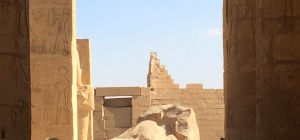 Ode to Ozymandias: The giant toppled statue of Ramses II in his mortuary temple, the Ramesseum, is the inspiration for Shelley’s poem. On the West Bank of the Nile at Luxor, outside the Valley of the Kings, we stop at this empty site. It is atmospheric and poignant with the words of the poet in my head, the bright green line of the lush agricultural valley beyond, drawing a sharp distinction between the thin strip of irrigated lifeline and endless bleak desert stretching away on either side.
Ode to Ozymandias: The giant toppled statue of Ramses II in his mortuary temple, the Ramesseum, is the inspiration for Shelley’s poem. On the West Bank of the Nile at Luxor, outside the Valley of the Kings, we stop at this empty site. It is atmospheric and poignant with the words of the poet in my head, the bright green line of the lush agricultural valley beyond, drawing a sharp distinction between the thin strip of irrigated lifeline and endless bleak desert stretching away on either side.
The tombs of the kings are surprisingly full of Chinese and Egyptian tourists — the first tourists in any number we’ve seen. Now that Sash has joined us in Luxor (yippee) and we have his amazing Arabic fluency on our side, he talks our way into additional kings’ tombs by baksheesh-ing a guard. We pick up a Korean American med student who thinks we look like we know what we’re doing, and we march down into the tunneled earth with the first painted carvings and hieroglyphs that we’ve seen. All of these tombs had been looted and robbed in antiquity, but nobody cared about the wall carvings which are remarkably well-preserved. Sash goes off-road (of course) and ignores the “Do Not Enter” signs to roam among the archeological field work. It’s astounding that they can re-create entire statues from bits and pieces.
The Colossi of Memnon were ancient when the Romans were around. Even Emperor Hadrian was a tourist, setting up camp at the feet of the statues, leaving behind signature graffiti. Busloads of Chinese tourists show up. Why? Sasha figures out that it’s Chinese New Year and these are the new wealthy Chinese on the move and not returning to their family villages as is traditional.
Back in Luxor we are staying at the shabbily elegant Winter Palace Hotel, right out of a turn of the century movie. But as soon as you step outside, you know you are in the Arab world – and one that is aching for lack of tourists. It’s a gauntlet of taxi drivers, caleche drivers, fake guides, and hawkers of tourist chatchkes. They are good-humored and so are we, but if you don’t know the game you might find this overwhelming. (They can follow you for blocks). Drums start beating across the street and we join in a wedding celebration from a respectful distance. The bride is serenaded by male drummers all the way from her emergence from the hairdresser (?) to the be-ribboned car that awaits. The celebration takes place on the sidewalk. We saw a similar ceremony in Aswan, although with a more African beat and lots of ululating, which I try to imitate, sounding like a monkey.
Hanging out at dusk in Luxor as the sun sets over the Nile with the Hypostyle Hall columns of the Temple of Luxor in the background. It’s somewhere between 5:00 prayers and 7:00 prayers when it seems like all you hear is the call to prayer and then prayer itself, ricocheting off the many minarets in a cacophony of disjointed beseeching. Sash and I walk through the tourist souk where we are hit up every step of the way (and you have to feel sorry for these guys, their way of life is virtually destroyed) into the regular souk where no tourists go, and only locals shop and everyone ignores us because we aren’t likely to buy cabbages. We see the occasional German tourist, often dressed in sandals and kefiye. Who in their right mind wears sandals in a souk? The Chinese, so obvious at the tourist sites, are nowhere to be seen.

In the souk we see faded wall posters with Morsi’s picture, presumably of support, although maybe not. Morsi’s ultimate downfall started here in Luxor when he appointed a governor who was a former member of Gemal Islamiya, the radical offshoot of the Muslim Brotherhood, responsible for the massacre of tourists in Luxor in the 90s and for the resulting resounding end to 100 years of lucrative tourism. To their credit, the citizens of Luxor went nuts and started the ultimate ouster of Morsi. It is a sad and troubling story that people who have been so badly governed for so long tried to get better governance and ended up with chaos, another military dictatorship and a deeply uncertain future.
Bales of Egyptian cotton for sale. The cotton business started during the American Civil War when the Brits needed a predictable source of cotton to replace Confederate cotton. Egypt is still a large producer.
The Luxor Temple at night seen from the banks of the Nile. Open until quite late and very atmospheric. The mosque to the left was founded 1,000 years ago and it is now permanently part of the site. It is estimated that excavated and restored antiquities throughout Egypt represent only 25% of what is still hidden and buried.
The right hand hallway of the Winter Palace hotel off the central lobby. The left-hand hallway leads to the bar which looks as though Winston Churchill just walked out. The Maitre D’ of the bar has probably been here for decades; I watch him greet old friends and repeat clients and enquire after each others’ families. The night I waited up for Sash, whose flight was very delayed, he kept showing up to check on me. Good mama, he announced to Sash the next day.








